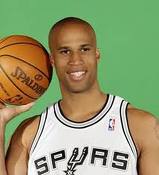For the several years of his professional basketball career,
Richard Jefferson was an extremely successful, popular, and accomplished player.
A quick review of the first part of Jefferson’s career, (courtesy of
Basketball-Reference.com), reveals two appearances in the NBA Finals, one year as a Top 10 scorer in the league, and two years averaging over 22 points scored per game.

Prior to the 2009-2010 season Jefferson was traded to the San Antonio Spurs, one of the best teams in the league over the past decade, and winners of four NBA championships in the last twelve years.
The Spurs roster is laden with all-time greats (
Tim Duncan), current stars (
Manu Ginobili), and international point guards/pretty boys (
Tony Parker). Their head coach, Gregg Popovich is regarded as one of the top two or three coaches in the entire league. While still a top-team, the Spurs core were starting to show some age, and an infusion of a fast, athletic, wing player who could score (Jefferson, pretty much exactly), was seen as an important step to help keep the Spurs in title contention.
So on paper the addition of Jefferson, an established solid-almost-star type player, to a team with a consistent winning tradition, full of smart, talented players, and a great coach should have been (forgive yet another basketball reference), a slam-dunk. After a short adjustment period by the player and the team, Jefferson should have thrived, and the team should have greatly benefited and improved their overall play.
So what actually happened in Jefferson’s first year with the Spurs?
He struggled. Mightily. His per game averages for scoring, rebounds, and assists plummeted from the performance standards he had established the past several seasons with his former team. Watching Jefferson play, he never seemed in synch or comfortable with the Spurs’ systems, and meshing with the other star players on the team. Jefferson looked unsure, a step slow, and eventually it appeared like his confidence was shot, and ultimately he had the worst year of his career, by both statistical and observational objectives.
A classic bad signing, or in the workplace context, a bad hire.
Maybe.
Conventional wisdom says the organization needs to cut their losses, to find a way out of the contract, trade Jefferson for whatever they could get, or in the ‘normal’ world of work, simply give him the old, ‘It’s not working out’ speech and wish him well on the way out the door. A bad hire is a bad hire, right?
So what did the Spurs do after the 2009-2010 season ended?
Instead of figuring out how to get whatever they could for Jefferson on the market, team coaches and officials challenged Jefferson to change his approach to the game to better fit his new team, their proven and successful playing style, and Coach Popovich’s expectations. For a veteran player, one that had quite a bit of personal success in this career, it would have been easy for Jefferson to balk or gripe or to pretend that the problem with his performance was some one else's.
Instead, Jefferson bought in to the program, and in the off-season worked hard on the specific parts of his game that needed improvement and refinement to better align with the team goals and style of play. So far, in 2010-2011 his performance is improved, and the team has had the best record in the league for most of the season. Sure, over time, age (Jefferson is 30, an age at which peak basketball performance is usually passed), and other factors might conspire to detract from his individual performance, but certainly through just over half of the season the decision by the team and player to work though their adjustment issues, and commit to doing the necessary work to adapt and improve appears to have been a good one.
Ultimately while Jefferson is no longer a star player, he is an important contributor making a significant impact on what is currently the best team in the league. Will the Spurs win the championship this year? Who knows. But by most accounts the team’s decision to stick by their ‘bad hire’ a little bit longer than many would have wished seems to be paying off.
In the workplace it is often said that many leaders are too slow to pull the plug on under performers, and while that is certainly true in many cases it is likely also true that some leaders and organizations are too hasty. Even traditionally strong performers, when placed into an entirely new environment, with new colleagues, systems, norms, and expectations, might take longer that originally hoped to make the necessary adjustments.
How long is too long? When do you label someone a ‘bad hire?’
And when do you as a leader and organization make a commitment and challenge to turn the ‘bad hire’ into a high performer?
Postscript - I really can’t stand the Spurs, but that is because as a Knicks fan I am jealous of their success.

 Steve
Steve



